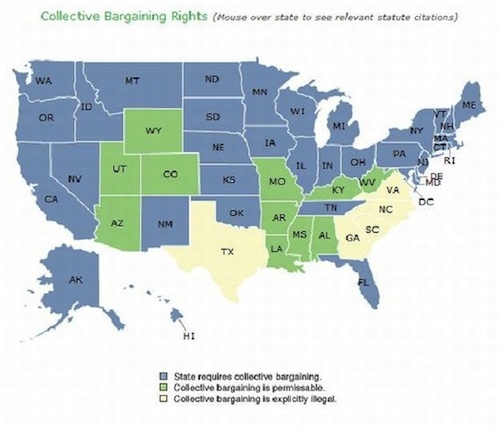Originally published in the Purcellville Gazette, March 4, 2011
By John P. Flannery

Con Ed Union Workers - "Dig we must for a growing New York."
My paternal grandmother had her children at home in her walk up apartment in the Bronx.
My grandfather told me, “we’d never have been able to raise your father and his brother and his sisters if it wasn’t for the union at Con Ed; we couldn’t have bargained for these wages and benefits individually.”
Ultimately, my father and his brother worked for Con Ed, and so did my younger brother Charles for a time.
Edward Bennet Williams, a great criminal defense lawyer, used to say to his clients, “We all hang together, or we all hang separately.”
That’s the basic principle of labor negotiation – a union of collective interest hanging together.
When I was still in grammar school, my grandfather would watch the talking heads on Sunday, then in black and white, and I sat at his elbow; he would rail at the corporate bosses making twenty times what the workers were getting, living off their excess profits instead of sharing some of it with the workers who made the profits possible in the first case.
The times are different and things are worse.
Bosses make an even higher multiple than their employees, and employees have fewer rights and less power to bargain on an equal footing.
Without unions, without bargaining leverage, what you have are adhesion contracts, those take it or leave it provisions, in 8 pica type, where you surrender all your rights.
Such adhesion contracts are often thrown out in court because they are unconscionable.
But the legislation that provides for workers bargaining has grown weak over the years.
The standard of a civilization is how we treat our own but the standard of the corporate givers is how much profit they can make, what government function they can privatize, what reprisals they can impose on workers who oppose them for their excesses, and what fair benefits may they withhold.
The businesses who think they are plantation owners and their workers, their slaves, have found ready allies in federal and state elected officials.
The class warfare we confront is those who have too much refusing to pay their fair share while taking from those who have less.
At the national and the state level, we see tax give backs to the wealthiest from deficit-ridden federal and state treasuries and, moments or months later, we’re told these same governmental entities want to cut the salaries, benefits and retirements of those who are not wealthy at all in order to cure the deficit they helped aggravate by their corporate give backs and largesse.
We are being taught to hate union workers today, but every other worker is next, as these businesses scheme to send more jobs offshore, and to cut your social security, medicare, health care, education, whatever means more profit to them, as a fair exchange for their political gifting.
Click on image for interactive map.


Thanks! My own father taught me that. He dedicated his life as a diplomat to bringing a middle class to latin America.
Roger, what a cogent observation. I’d not thought of it that way.
You are anti-union to precisely the extent that you are economically illiterate.
A union is nothing more than a service firm, set up as a non-profit, that hires out labor under contract to other firms looking to use that labor to produce or procure or provide something. To be against something like that and to believe that you are still somehow ‘pro-market’ is delusional, at best.
Profit is a measure of inefficiency in a market – the more profit there is to be had, the harder a time the market has distributing that good or service. Being anti-union is just another way of saying “Only some people should benefit from market disequilibrium.” Whether you intend to be saying that or not is of no consequence, because that is what you are saying.
Thanks John.
On the Franklin quote, you are right but Edward Bennet Williams did use it – as i’ve said, and it seemed more current, post-unionism, and I did not fault Edward Bennet. One of my great heroes, RFK, had several quotes he used so often, he no longer attributed them, and I repeat them today, without attribution to the original source. And I’m glad that you liked what I wrote. John Flannery
Originally, but one can hardly be faulted for stealing it.
For what it’s worth, the “hang together” quote is from Benjamin Franklin, I believe. 🙂
This is a terrific article, thank you for letting us reprint it, John!